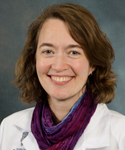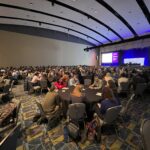 ORLANDO—In many ways, the ACR lives by the motto “the future is now.” This motto is clear with regard to the activities of the ACR’s Committee on Rheumatology Training and Workforce Issues (COTW), which seeks to assist rheumatology trainees with advancing their careers from an early stage. By developing curricula and educational tools, designing and implementing career development programs, monitoring career opportunities, providing networking platforms and resources for fellowship program directors, and surveying workforce trends, the committee helps young rheumatologists to be successful and find meaning in their work.
ORLANDO—In many ways, the ACR lives by the motto “the future is now.” This motto is clear with regard to the activities of the ACR’s Committee on Rheumatology Training and Workforce Issues (COTW), which seeks to assist rheumatology trainees with advancing their careers from an early stage. By developing curricula and educational tools, designing and implementing career development programs, monitoring career opportunities, providing networking platforms and resources for fellowship program directors, and surveying workforce trends, the committee helps young rheumatologists to be successful and find meaning in their work.
At the 2022 ACR Education Exchange, April 28–May 1, Bethany Marston, MD, associate professor in the Departments of Pediatrics and Medicine, University of Rochester, N.Y., and chair of the COTW, provided an overview of the committee’s most recent accomplishments.
V-FIT
In the age of COVID-19, Dr. Marston said there has been a push to make educational activities more widely accessible in an online, on-demand fashion. In this vein, the E-Learning Subcommittee of the COTW has helped put several initiatives under one roof. The chair of this subcommittee is Anisha Dua, MD, MPH, associate professor of medicine, Northwestern School of Medicine, Chicago. Under her leadership, the subcommittee is working on several projects, including the Virtual Rheumatology Program for Fellows in Training (V-FIT). V-FIT is a compendium of online courses developed by rheumatology experts to address specific educational needs of fellows in training. All free of charge, the initiative’s four online courses are:
- Virtual Rheumatology Learning Collaborative (ViRL);
- Virtual Rheumatology Practicum—Adult (ViP Adult);
- Virtual Rheumatology Practicum—Pediatric (ViP Pediatric); and
- Virtual Rheumatology Teaching Lessons (ViTLs).
The ViRL program was an eight-week lecture series in 2020 that discussed such important topics as adult inflammatory eye disorders, rheumatoid arthritis pathogenesis, immune-related adverse events due to immune checkpoint inhibitors, nonradiographic axial spondyloarthritis and other subjects. The catalog and corresponding video links can be found online.
The ViP Adult program is intended for first-year rheumatology fellows and covers topics that include immunology basics for the general rheumatologist; approaches to hyperCKemia in rheumatology, rheumatic emergencies and musculoskeletal radiology. The third series, overseen by working group Chair Lisa Zickuhr, MD, assistant professor at Washington University in St. Louis, launched in July. Lectures for this series can be found online.
The ViP Pediatric program includes lectures on cytokine storm syndromes, autoinflammatory diseases, juvenile dermatomyositis and the approach to aches and pains in children. The third series of ViP Pediatric, overseen by working group Chair Stacey Tarvin, MD, MS, assistant professor of clinical pediatrics at Indiana University School of Medicine, was also launched in July. Lectures can be found online.
Finally, ViTLs is an interactive, monthly lecture series that takes a deep dive into specific topics targeted to fellows in adult rheumatology fellowship programs. Topics include sarcoidosis, psoriatic arthritis and mimicking conditions of rheumatic disease (i.e., mimics of scleroderma, vasculitis and spondyloarthritis). The 2021 and 2022 lecture series can be found online.
V-FIT is a compendium of online courses developed by rheumatology experts to address specific educational needs of fellows in training.
More Programs
The COTW also works on online education modules, which include the Rheum4Science modules overseen by working group Chair Adam Kilian, MD, assistant professor of medicine at the Saint Louis University School of Medicine. These modules are geared toward rheumatology fellows in training, medical students, residents, practicing rheumatologists and other rheumatology healthcare providers interested in strengthening their understanding of basic scientific principles and clinical research methodology relevant to the field of rheumatology.
Topics covered by these modules include an overview of innate immunity and toll-like receptors in rheumatic disease, and future modules will include fundamental principles of B cell immunobiology and T cells for the rheumatologist. The modules can be found online.
Next, Dr. Marston discussed the Rheum2Learn modules, which were developed to teach residents in internal medicine about common rheumatology problems and provide a foundation for what they will see and learn during rheumatology rotations. Under the leadership of working group chair Sonam Kiwalkar, MD, a rheumatologist with the Vancouver Clinic, Vancouver, Wash., Rheum2Learn’s 15 modules will be converted from asynchronous, text-based activities to an asynchronous, interactive program using multimedia theory and principles of reasoning. All module updates are expected to be complete by June 2025. The current modules can be found online.
Dr. Marston also described the work of the Curriculum Subcommittee, chaired by Sharon Dowell, MD, associate professor of Internal Medicine at Howard University, Washington, D.C. In 2022, the main project for this subcommittee will be to map the new Accreditation Council for Graduate Medical Education Rheumatology Milestones to educational curricula for rheumatology fellows in training.1 This subcommittee is also in the process of evaluating several minicurricula from the ACR, such as those for sexual health, health disparities and Healthy Outcomes in Pregnancy in SLE Through Education of Providers (HOP-STEP).
Another important subcommittee is the Adult Rheumatology In-Training Exam Taskforce, which oversees the annual test—for which 560 fellows enrolled in 2022—and provides valuable feedback to fellowship program directors about the strengths and knowledge gaps among their fellows.
In conclusion, Dr. Marston discussed sessions at the conference that focused on providing helpful resources for new fellowship program directors, a needs assessment geared toward early-career and international, fellow-in-training medical graduates, and a listening tour looking at workforce solutions for issues affecting academia and private practice.
Additionally, Dr. Marston answered audience questions, which included how to best help busy fellows fit all of these resources into their compact schedules. She said the needs of each individual fellow may dictate his or her learning plan. Thus, some resources may help fill knowledge gaps for one fellow, while other resources may benefit another fellow with different areas for improvement.
The session was enlightening and provided many tools for fellows in training, fellowship program directors and clinicians who may benefit from the expansive work of the COTW. Indeed, thanks to such a wide array of initiatives, the committee is helping to make training work every single day and for each and every fellow.
Jason Liebowitz, MD, completed his fellowship in rheumatology at Johns Hopkins University, Baltimore, where he also earned his medical degree. He is currently in practice with Skylands Medical Group, N.J.
Reference
- Liebowitz JE, Torralba KD, Kolfenbach J, et al. Rheumatology milestones 2.0: A roadmap for competency-based medical training of rheumatology fellows in the 21st century. Arthritis Care Res (Hoboken). 2022 Apr;74(4):675–685.



